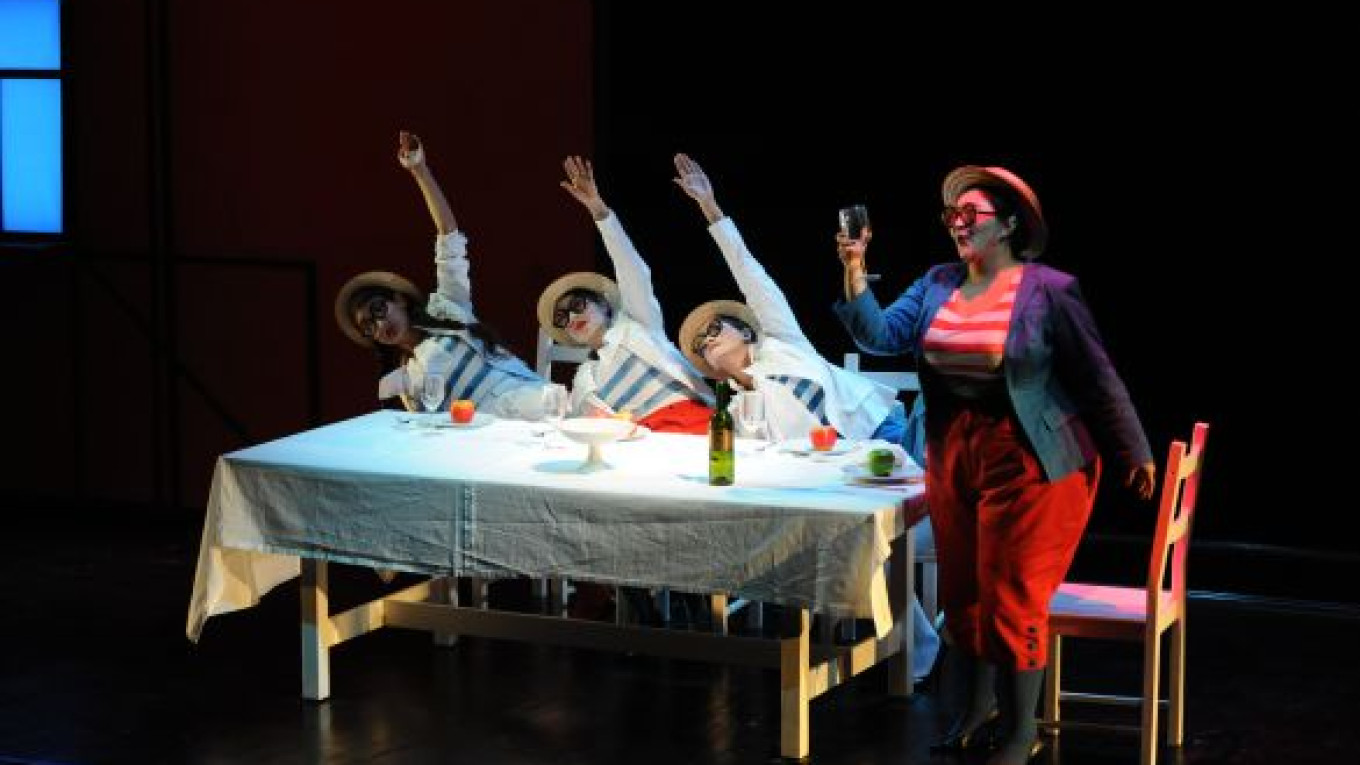Giving the current opera season a welcome shot of novelty, the Stanislavsky and Nemirovich-Danchenko Musical Theater has come up with a pair of little-known short works by French composers from the early decades of the 20th century. Played on the theater’s Small Stage and joined together under the collective title “Cafe Socrates,” the works in question are Erik Satie’s “Socrate” (Socrates) and Darius Milhaud’s “Le pauvre matelot” (The Poor Sailor).
“Socrate,” which premiered in 1918, and “Le pauvre matelot,” which made its debut nine years later, have nothing at all in common, apart from the fact that their respective composers were both important members of the French musical avant-garde that arose in the years immediately leading up to World War I and reached its heyday in the decade that followed the war’s conclusion. Yet despite their diverse nature, the two play very well as a pair, and the Stanislavsky and Nemirovich-Danchenko gives them a performance of superior quality.
Director Anatoly Ledukhovsky treats both works as burlesque, an approach very much in keeping with the spirit of the time in which they were written, a time of broad-scale attack in the arts on sacred cows and musty traditions of the past. And in both cases, the minimalist decor of designer Sergei Barkhin — the facade of Cafe Socrates, a table and a few chairs — serves as a perfectly appropriate setting for the action.? ? ? ?
Satie, born in 1866, was one of the fathers of the early 20th-century avant-garde and at his best in writing miniature pieces for piano, which, in the words of American critic Alex Ross, “discarded centuries of knotted-brow complexity in favor of a language at once simple and new.” That same language is very much evident in the tranquil and delicately beautiful orchestral accompaniment to “Socrate.” Conductor Felix Korobov and the Stanislavsky and Nemirovich-Danchenko orchestra capture it superbly.
Satie described “Socrate” as a “symphonic drama” rather than an opera. It amounts simply to a setting of three excerpts from the works of Plato, titled “Portrait of Socrates,” “The Banks of the Ilissus” and “Death of Socrates,” given a sung recitation by a quartet of women playing the male characters specified by Plato. The drama of “Socrate” lies almost entirely in its words, and appreciating the work absolutely requires a familiarity with the text. For those unable to understand the text as sung in French, the theater provides a Russian translation both in its program leaflet and, during the performance, on a screen at the side of the stage. English translations of “Socrate” can readily be found on the Internet.
To emphasize the mock-seriousness of the proceedings, the singers appear in clown-like makeup, horn-rimmed glasses, straw hats and costumes padded in such a way as to give them grossly voluptuous figures. Both singing and acting on the part of all four in the initial cast is of very high standard, with a special nod due to mezzo-soprano Larisa Andreyeva, as Phaedo, for her smoothly sung and wonderfully straight-forward account of Socrates’ death.
Milhaud, 26 years Satie’s junior, is chiefly thought of today as a composer of rather light-weight, melodious scores, much influenced by American jazz, and as the teacher of a host of composers, including such notables as Steve Reich, Philip Glass, Iannis Xenakis and Dave Brubeck.
“Le pauvre matelot” presents a complete contrast to “Socrate,” a bizarre, fast-moving tale of mistaken-identity and murder, devised by Jean Cocteau, set to a fast-moving and often raucous score. It, too, has four characters, the Sailor, who returns home after 15 years at sea, the Wife, who keeps a portside bar and has remained faithful all those years, the Sailor’s Father-in-Law and the Sailor’s Friend, who keeps a wine shop opposite the bar. To sum the story up, the Wife fails to recognize the Sailor on his return home and murders him for the treasures he seems to be carrying (which turn out here to be a suitcase full of identical red-colored women’s shoes).
As in the case of “Socrate,” the Stanislavsky and Nemirovich-Danchenko fields a cast for “Le pauvre matelot” that sing and play it to the hilt. Most notable of all is soprano Amalia Gogeshvili, previously unknown to me, whose gorgeously sung and winningly played account of the Wife would seem to place her among very best singing actresses to be found these days on the Moscow operatic stage.
The 90-minute-long evening ends on an appropriately satirical note, with the two casts joining together to dance a brief cancan to music by another French composer of Satie’s and Milhaud’s era, Jacques Ibert.
“Cafe Socrates” (Kafe Sokrat) next plays on May 28, June 24 and July 10 at 7 p.m. on the Small Stage of the Stanislavsky and Nemirovich-Danchenko. 17 Bolshaya Dmitrovka. Metro Chekhovskaya. Tel. 650-2835, www.stanmus.ru.
A Message from The Moscow Times:
Dear readers,
We are facing unprecedented challenges. Russia's Prosecutor General's Office has designated The Moscow Times as an "undesirable" organization, criminalizing our work and putting our staff at risk of prosecution. This follows our earlier unjust labeling as a "foreign agent."
These actions are direct attempts to silence independent journalism in Russia. The authorities claim our work "discredits the decisions of the Russian leadership." We see things differently: we strive to provide accurate, unbiased reporting on Russia.
We, the journalists of The Moscow Times, refuse to be silenced. But to continue our work, we need your help.
Your support, no matter how small, makes a world of difference. If you can, please support us monthly starting from just $2. It's quick to set up, and every contribution makes a significant impact.
By supporting The Moscow Times, you're defending open, independent journalism in the face of repression. Thank you for standing with us.
Remind me later.


